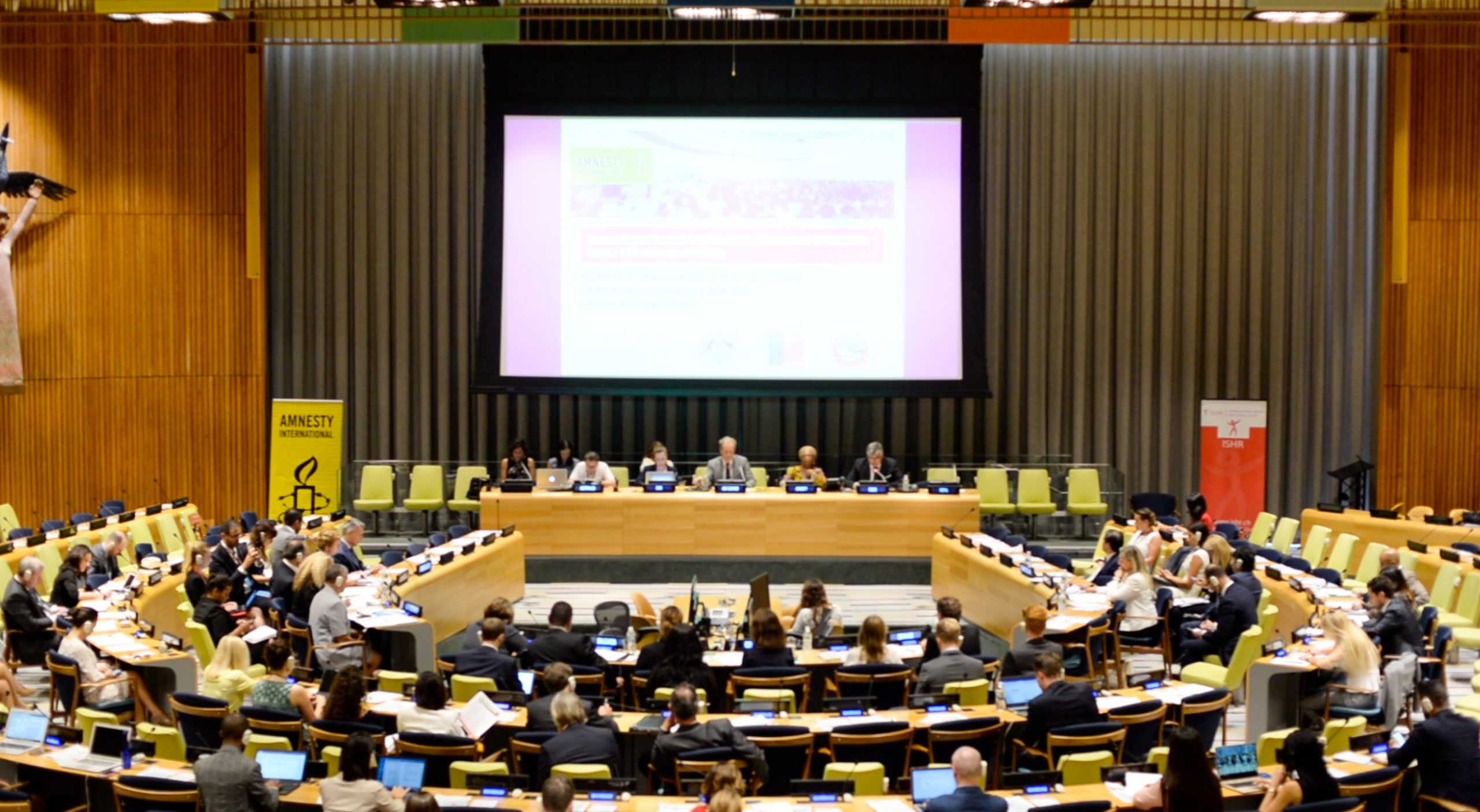Dialogue between civil society and States is instrumental for the advancement of human rights. The Pledging Events, organised each year by ISHR and Amnesty International, provide a critical opportunity for civil society to directly and constructively engage with candidate States for the Human Rights Council, the chief UN body addressing human rights violations.
The events aim to enhance transparency and accountability in Human Rights Council elections and improve adherence to Council membership standards. Toward these goals, candidate States were asked questions from the audience and Twitter using the hashtag #HRCPledging.
States committed to transparency and dialogue
Eight candidate States participated in both events—Austria, Argentina, Bahamas, Bulgaria, Czech Republic, Denmark, Italy and Uruguay, while Fiji participated in the Geneva event. In participating these States demonstrated their commitment to civil society’s voice in the Council’s work.
Unfortunately, nine candidates States—Bahrain, Bangladesh, Burkina Faso, Cameroon, Eritrea, India, Philippines, Somalia and Togo—either declined to participate or did not respond to the invitation. It is worth acknowledging that Burkina Faso did attend, but declined to participate in, the event in Geneva. The decision not to participate is particularly disappointing, and suggests a lack of willingness on the part of these States to prioritize transparency and dialogue.
During the event, audience members expressed concern about the absence of these States, and indicated that if they had attended they would have asked them pertinent questions, including –
- Why do Bahrain’s voluntary pledges include addressing ‘incitement of anti-nationalism’, essentially committing to continue violating freedom of expression as a Council member?
- Will Eritrea commit to cooperating with the Special Rapporteur on Eritrea established by the Human Rights Council, considering that cooperation with Council mechanisms is required of Council members?
- What India would respond regarding the request to visit the country from the Special Rapporteur on the right to freedom of expression, David Kaye?
- How would the Philippines ensure its compliance to the obligation to cooperate with UN human rights mechanisms, including a possible future UN led independent international investigation?
Discussion on human rights issues
Despite the absence of some States, key human rights issues were addressed in a fruitful discussion. Civil society’s voice in the Council’s work was supported across the board. Argentina, Italy, Bulgaria and others highlighted their commitment to cooperate with civil society organisations. The Czech Republic added, ‘Civil society organisations are one of the main stakeholders in making our work better in the Council,’ noting that defenders are a top priority and that special attention must be paid to women defenders.
Protection of the rights of LGBTI persons were also at the forefront of the discussion. States, including the Bahamas, the Czech Republic and Denmark, indicated they would support the renewal of the mandate of the Independent Expert on violence and discrimination based on sexual orientation and gender identity.
Reprisals, attacks against defenders for engaging with the United Nations, were addressed. In positive news for defenders, all States condemned attacks against them. More specifically, Italy noted that it created focal points at every Italian embassy to assist human rights defenders. Austria added, ‘We will continue to condemn any act of reprisal and take necessary follow up with the UN bodies when actions against reprisals are taken by them, to make sure all are accountable.’
In addition, all participating States expressed their commitment to improving the Human Rights Council itself. Candidate States pledged to work with other States to improve efficiency within the Council.
The candidate States also made the following comments:
- Austria stated it is important to see Human Rights Council as credible, legitimate, and as taking action, and will work to improve the Council’s responses for pressing problems.
- Argentina pledged to empower Human Rights Council to act effectively in urgent situations involving serious violations of human rights and give absolute liberty to mandate holders.
- Bahamas intends to advocate for human rights standards compliance within its subregion and commits to sharing its experiences at the United Nations at the regional level.
- Bulgaria indicated that allocation of funds to the Council should be increased.
- Czech Republic promised to work to ensure United Nations mechanisms are respected.
- Denmark pledged to support renewal of the sexual orientation and gender identity expert mandate and to ensuring civil society’s voice in the Council.
- Fiji committed to giving the South Pacific region a voice in the Council.
- Italy pledged to work as a Council member to combat international crimes and impunity.
- Uruguay committed to encourage cooperation among States regarding discussion around issues related to human rights, even those that are sensitive and difficult to address.
The events had the generous sponsorship of Albania, Australia, Chile, Mongolia, Nepal and Senegal, and were moderated by Andrew Gilmour, Assistant Secretary-General for Human Rights, in New York, and Peggy Hicks, Director of Thematic Engagement, Special Procedures and Right to Development Division at the Office of the High Commissioner for Human Rights, in Geneva.
For more information concerning the upcoming Human Rights Council election and to view our scorecards, which offer a quick, objective comparison of the human rights situation of candidate States, click here.
You can watch the Geneva parallel event on the ISHR YouTube channel.
Photos of the discussions can be found on our Facebook page.




